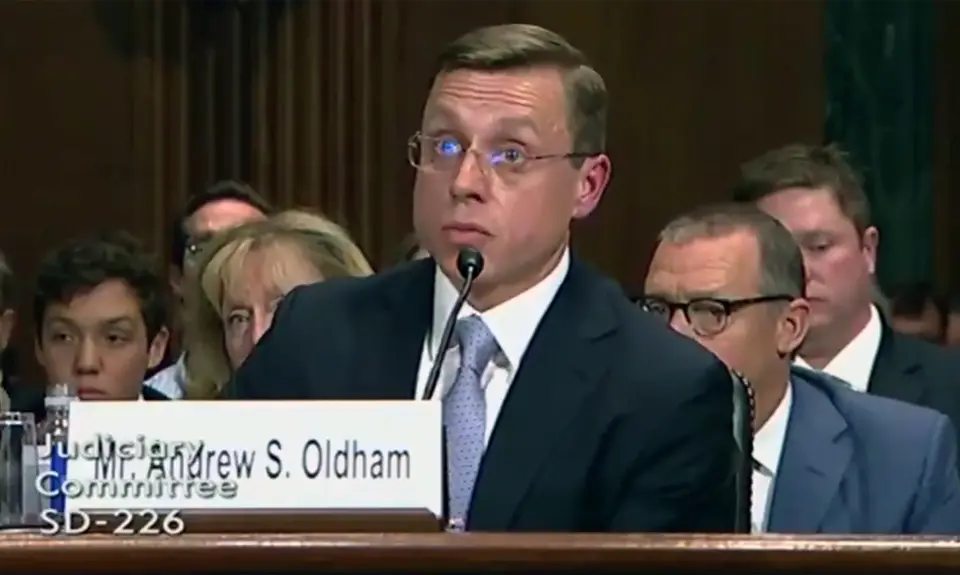President Trump’s latest Fifth Circuit nominee Andrew Oldham had his committee hearing on Wednesday, April 25. He has challenged the constitutional legitimacy of the federal agencies that protect the environment, working people, consumers, hurricane victims, and more. As explained in PFAW’s letter opposing Oldham’s nomination, his record is that of a narrow-minded elitist who would fight against constitutional values of equality and justice.
His confirmation hearing made that even more clear.
Like Wendy Vitter, he refused to say to Sen. Blumenthal that Brown v. Board of Education was correctly decided. Like all of Trump’s nominees, he said he would simply apply precedent, but Sen. Hirono pointed out that an ideological judge can always find some difference between a precedent and the exact case before them.
Today, Andrew Oldham joined Wendy Vitter in refusing to say whether Brown v. Board was correctly decided. This non-answer is an affront to civil rights and the rule of law. Supporting a ruling that began the process of ending legalized apartheid in the U.S. should be mandatory. pic.twitter.com/NU8Zab18Nx
— Legal Defense Fund (@NAACP_LDF) April 25, 2018
Sen. Kamala Harris asked a simple question: does voting discrimination exist, as even Chief Justice Roberts has acknowledged? Oldham wouldn’t say, claiming it would be “inappropriate” to express an opinion on Supreme Court precedent. (Of course, that isn’t what he was being asked to do.) Sen. Harris asked him for his thoughts based on his own experience, unrelated to any judicial precedents – and again he refused to answer, claiming he cannot comment on political matters.
WATCH: @SenKamalaHarris asked 5th Circuit nominee Andrew Oldham today whether he believes voting discrimination exists. He repeatedly refused to answer her question.
The 5th Circuit, which has millions of residents of color, deserves better. We all do. #courtsmatter pic.twitter.com/belTGW3EEH
— The Leadership Conference (@civilrightsorg) April 25, 2018
He similarly avoided answering Sen. Cory Booker’s question about whether implicit racial bias exists in the criminal justice system. When Booker cited studies showing enormous sentencing disparities between white defendants and people of color, Oldham responded that social science research is not his area of expertise, but that he would support equality before the law. Of course, the “implicit” part of implicit bias means that racial injustice is occurring even when there are no bad intentions, so it was another evasive response.
.@SenBooker also tried to see if Andrew Oldham believed voting discrimination exists. Yet again, Oldham refused to answer.
Oldham is up for a lifetime seat on the federal bench. This is unacceptable. #courtsmatter #ProtectOurCourts #StopOldham pic.twitter.com/dZmlnCorFV
— Alliance for Justice (@AFJustice) April 25, 2018
But perhaps the most bizarre assertion came when Sen. Durbin asked about sharp criticisms Oldham has made of the Supreme Court, followed up by Sen. Whitehouse citing Oldham’s assertion that the EPA, Department of Labor, and IRS are illegitimate. The nominee didn’t deny saying any of that, but he claimed he was speaking only as an advocate for his client, Texas Gov. Greg Abbott.
WATCH: @SenWhitehouse questions how Andrew Oldham, a judicial nominee, could express rage at the supposed illegitimacy of administrative agencies, yet claim he would have no agenda as a judge. https://t.co/Xnb1jcgMrg #ProtectOurCourts #CourtsMatter pic.twitter.com/zGerdnHSkv
— PFAW (@peoplefor) April 26, 2018
Whitehouse: Now come on, don’t kid me. You know perfectly well in that speech, you used a word that is highly personal, didn’t you.
Oldham: [silence]
Whitehouse: You said that it was “enraging.” Were you talking about somebody else when you said that you were enraged by the illegitimate administrative state? That’s not speaking on behalf of the governor, not when you’re talking about your own emotions, I don’t think. I mean, don’t kid me here.
Oldham: Senator, I am being quite serious when I say that I was advocating on behalf of a client that was part of a broader challenge that we had been having in the state of Texas against various procedures that federal administrative agencies were using.
Whitehouse: Were you or were you not enraged when you said it was enraging?
Oldham said he was simply frustrated on behalf of his client, but he avoided saying whether he was enraged. So Whitehouse kept asking.
Whitehouse: Can we clear up for a minute this “on behalf of my client” thing? You said “from the governor’s perspective and mine.” Who is the “mine” you referred to in that comment? Was that yourself?
Oops.
The nominee who has expressed rage at the supposed illegitimacy of administrative agencies then claimed he would have no agenda as a judge.
Whitehouse: The trajectory of your rhetoric on this subject makes the likelihood of a 180 like that a little improbable.
Indeed it does.
